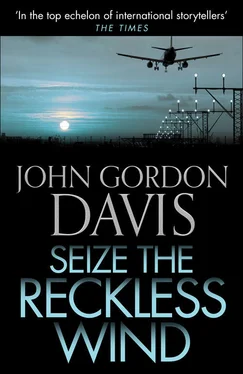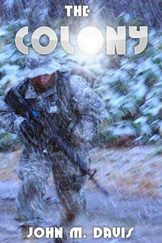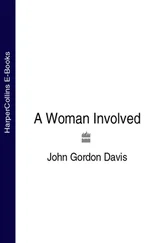She stood in his arms a long moment. Then she said gently: ‘Breakfast is ready.’
After that he composed himself. They drove to Heathrow airport, with Cathy sitting between them. They were silent all the way. He checked them in. They had ample time for coffee, but he could not bear it.
He picked up Cathy. He held her tight, and his throat was thick as he said: ‘Look after Mommy, won’t you, darling?’
Then he turned to Shelagh. Her eyes were clear and steady. He held her tight once, then kissed her cheek.
‘Goodbye,’ he whispered. ‘Good luck.’
She smiled. ‘Good luck.’
‘Go on,’ he said. ‘Go now.’
She took Cathy by the hand and turned, without looking at him. He watched them walk away, Cathy toddling along. At the door Shelagh stopped, and looked back, smiled, then waved; then she bent and waved Cathy’s hand at her daddy.
Then they went through the door.
He walked out of the concourse, the tears running down his face. He got into his car, began to start it: then he dropped his face into his hands and wept.
For five minutes he sat there. Then he dragged his wrist across his eyes. He did not want to leave the place he had last seen his wife and child, but he made himself. He drove slowly out of the parking block, then into the tunnel. He drove through the tunnel, out at the other end; he drove slowly round the traffic island, and back into the tunnel, back to the airport again.
He went up to the observation lounge. He could see the plane, but not the passengers boarding. He just stood there and watched the plane.
Finally the Boeing reversed out of the bay. He imagined Shelagh and Cathy inside. He watched it taxi, disappear from sight: then it reappeared, roaring down the runway, fast and faster; it took off, and his heart finally broke, and he sobbed out loud.
He watched it go, getting smaller and smaller. Then it was gone, into the clouds.
But he did not want to leave the airport, the last place he had seen his wife and child.
PART 3
Now, this is how you fly a bloody great aeroplane. It’s simple really: a simple matter of life and death.
First, you’ve tanked up with twenty-five tons of fuel, which is the combined weight of five adult elephants, to blast your twenty-five tons of cargo (another five elephants) plus fifty tons of aeroplane (ten elephants) through thin air in defiance of gravity. You’ve filed your Flight Plan, telling the guys in control the route you’d like to fly. Now you’re waiting on the runway, engines whining, brakes on, waiting for them to tell you it’s safe to go, waiting for a gap in that black sky midst all those dozens of other aeroplanes screaming around on top of each other all wanting to come in, all of you blindly relying on that same little guy in his control room who’s looking at his radar set. And then he says Go , and, boy, off you go.
Blindly trusting in the blind faith everybody has in everybody else, galloping down the black runway, the lights flashing past, eighty miles an hour, ninety, a hundred, just praying you don’t burst a tyre. Then you reach V1, the speed at which you become committed to taking off, you cannot stop now without killing yourself and making everybody very cross. You reach VR, ease back the stick, up comes the nose, and, bingo, you’ve done it, you’re airborne! Lifting up into thin air, you and your twenty-odd elephants. Up up up you go into the blackness where the little guy told you to, aiming for that nice gap he’s found for you between all those friendly aeroplanes screaming around in circles up there; but it’s O.K. because he’s watching you all on his radar screen. Sometimes he screams over the radio, ‘ Romeo Yankee, left, turn left ’ and you holler, ‘ O.K., left! ’ – and some fucking great machine comes screaming out of the blackness, just missing you. But not often, hell no, those guys are good; anybody can make a mistake. And you’re on your way to sunny Africa or wherever, and he hands you over to the next control sector. You twiddle that up on your radio and in Paris some dolly-bird says, ‘ Oui – oui , Romeo Yankee, I have you …’ And you tell her your compass heading and the slab of air the little guy allocated you and she says, ‘O.K., bon soir .’ Or she says something like, ‘Descend a thousand feet, somebody’s coming!’ And, boy, you do as you’re told. As simple as that. It gave Mahoney the screaming heebie-jeebies.
‘Hell, England’s easy,’ said Ed. ‘You should see some of the balls-up airports I’ve flown into, especially in Africa. Sometimes you have to fly low over the control tower to wake them up.’
‘Give me Africa every time,’ Mahoney said, ‘at least you’re the only plane in the sky there. It’s going for the gap between all the other guys that gives me the willies.’
‘You’ve got to learn to relax, or you don’t do this job.’
‘I’m only doing the job, Ed, until we can afford to keep me on the ground, believe me.’
‘Well, that may be some time, boss, so you better learn to quit passing me the buck everytime something tricky happens.’
‘You’re the fleet-captain. Of course I pass the buck; that’s what I pay you for.’
‘Not very much. You should fly more with the other guys, stop being so dependent on me. Fly as captain for a change.’
‘Fly as captain? Never,’ Mahoney said. ‘Never.’
‘Take responsibility. You’re quite a good pilot, really.’
‘I’m a lousy pilot, I’m only here to make up the numbers. You want to take over some of my responsibilities? You’re quite a good co-director, really.’
‘Hell, no. Never,’ Ed said. ‘O.K. – go and work, boss.’
And Mahoney got out of his seat and sat at the fold-away table that Pomeroy had made for him, and he worked on Redcoat business that Dolores had packed for him. She prepared the same lists of SDDs (Suggested Dos and Don’ts) as she had done with his legal briefs in the old days. Nowadays it was: ‘O.K., sign encls.’ ‘Study carefully.’ ‘Have arranged appt with Bank Mgr for …’ ‘F. says pineapple glut, bananas O.K. this week …’ ‘This is prick who gave us so much trouble over …’
And there was the telephone. It went ‘bing-bong’ on the flight-deck, and that meant trouble because Dolores did not waste money. Engine trouble, or cargo trouble, or crew trouble. ‘That engine on the Britannia has gone on the blink again, Pomeroy says he’s got to take the whole thing out, at least five days, do you want me to charter an aircraft or do a handwringing exercise?’ Oh, God, engines! ‘Meredith has just lost the number two engine on the Canadair and turned back to Naples, which means tomorrow’s Khartoum cargo …’ ‘Pomeroy has just heard of an excellent second-hand engine going cheap in Cyprus; he must go there immediately to inspect it and this means that …’ And goddamn cargoes. Tour homeward-bound cargo has fallen through, but Abdullah in Uganda has got one. Is it worth flying empty from Ghana to fetch it? …’
The other big trouble was crew. Hard-luck crews, that’s what Redcoat tended to get. Ed Hazeltine and Mahoney were the only pilots in Redcoat’s full-time employment. For the rest, Redcoat hired pilots, flight by flight. There were usually plenty, with so many airlines retrenching. The trouble with pilots is they tend to drink, to relax from the unnatural business of defying gravity for a living. Bing-bong. ‘That cargo of bulls for Johannesburg? Well, Captain Meredith’s gone on a bender, he caught a tailwind and got home early and found his wife in the bathtub with you-know-who …’
‘Then get Mason!’
Читать дальше












